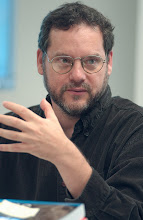EAOP Grad Becomes Newspaper Columnist on Grassroots Democracy
 EDITOR'S NOTE: Recently, EAOP grad Steve Kowal became a newspaper columnist for The New Hampshire Gazette, the nation's oldest newspaper. In his column, Steve offers his ideas about how local communities can defend themselves against unwanted corporate intrusions. The first piece in the series ran on November 13. His future pieces will be updates on Steve's work with Advocates for Community Empowerment, an organization that Steve co-founded this year with EAOP grad Ellen Hayes. I already reported on their work in a Well-Trained Activist post on October 23, 2006. However, I thought people might like to see Steve's first piece for The New Hampshire Gazette right here.
EDITOR'S NOTE: Recently, EAOP grad Steve Kowal became a newspaper columnist for The New Hampshire Gazette, the nation's oldest newspaper. In his column, Steve offers his ideas about how local communities can defend themselves against unwanted corporate intrusions. The first piece in the series ran on November 13. His future pieces will be updates on Steve's work with Advocates for Community Empowerment, an organization that Steve co-founded this year with EAOP grad Ellen Hayes. I already reported on their work in a Well-Trained Activist post on October 23, 2006. However, I thought people might like to see Steve's first piece for The New Hampshire Gazette right here.The Democracy Corner
by Steve Kowal
November 13, 2006
Every day, citizens throughout New Hampshire and elsewhere come face to face with the realities of corporate plans to enter their community with a polluting, toxic, extractive or noisy industrial project. But too often, even when a majority of citizens passionately oppose these plans, they lose – and the offending project becomes part of their lives.
This happens so often we’ve become used to the story. Alert community members foresee the negative impacts of what is being planned. A small group of “concerned citizens” bands together to stop it. They hire a lawyer, study the scientific and regulatory rules, create signs pleading for someone to “Stop the Project,” write letters to the editor, call their elected officials and go to countless regulatory meetings to beseech government officials to please consider their health and welfare.
All too often they fail. Yet, don’t we live in a democracy? And doesn’t it fly in the face of democracy when a handful of corporate executives can come into a community with an unwelcome project and trump the rights of thousands of citizens?
This happens because we are playing in the corporate-defined ball park, using their bats and balls and following their rules. For instance, even though corporations are fictitious entities that were originally chartered by state governments to serve the common good, over the past 200 years courts have endowed them with the same Constitutional rights that you and I have. Likewise, when we want to voice our concerns, we are channeled into the confusing government regulatory maze where the rules are saturated by corporate influences. We are required to follow a narrowly defined script written by agencies created to “permit” and “regulate” the destruction of our environment. Even so, we continue to fight within this system because we believe that it is the only thing we can do.
It’s not. A New England-based community activist group, Advocates for Community Empowerment (ACE), helps communities redirect the discussion away from confusing scientific details, reframing it around the rights of “we the people” to decide the future of our communities. Instead of getting quagmired in the regulatory run-around, ACE empowers communities to define their vision and enact it into fundamental local law, which by definition, disallows the offending project. These laws also strip corporations of their illegitimate rights to act as “persons” making them subservient, once again, to the will of the people.
ACE draws upon the innovative work and expertise of the Program on Corporations Law and Democracy and the Community Environmental Legal Defense Fund. Democracy advocate Richard Grossman and attorney Thomas Linzey of CELDF utilize cutting-edge, enforceable, legal strategies based on law rooted in the Bill of Rights and the federal and state constitutions. ACE and CELDF educate people about these concepts and strategies through an intensive weekend Democracy School™ for citizens and local officials.
Using CELDF’s legal strategies, visionary communities have taken the initiative to reclaim their rights to determine their own future. On September 19th, Tamaqua, Pennsylvania became the first community in the United States to bestow enforceable legal rights on nature. Last March, Barnstead, New Hampshire became the first community in New England to protect their water resources from corporate extraction while stripping corporations of their rights as “persons.”
So often we have allowed our communities to be defined by the corporate value of “endless more” rather than declaring our own values, vision and rules. Now, citizens in communities are reclaiming their power and sovereignty. They are standing up for themselves and, just as Howard Beale implored us to do in the 1976 film, Network, they are shouting, “I’m as mad as hell and I’m not going to take this anymore.”
Yet unlike a Hollywood movie, this is serious stuff. Now instead of just being “mad as hell” communities, at last, are choosing to use a new and powerful tool. This “new” tool is democracy.
For more information, call Steve Kowal at 603-431-9333.



